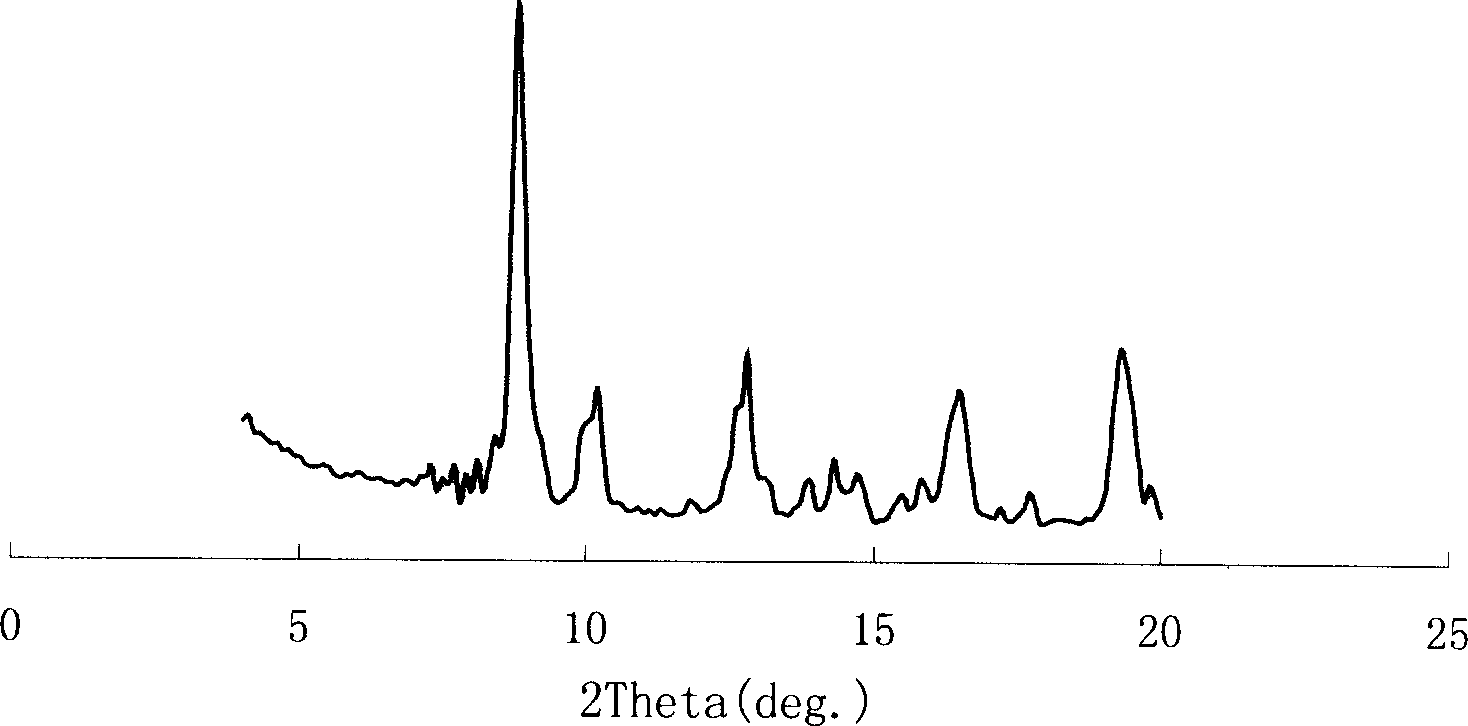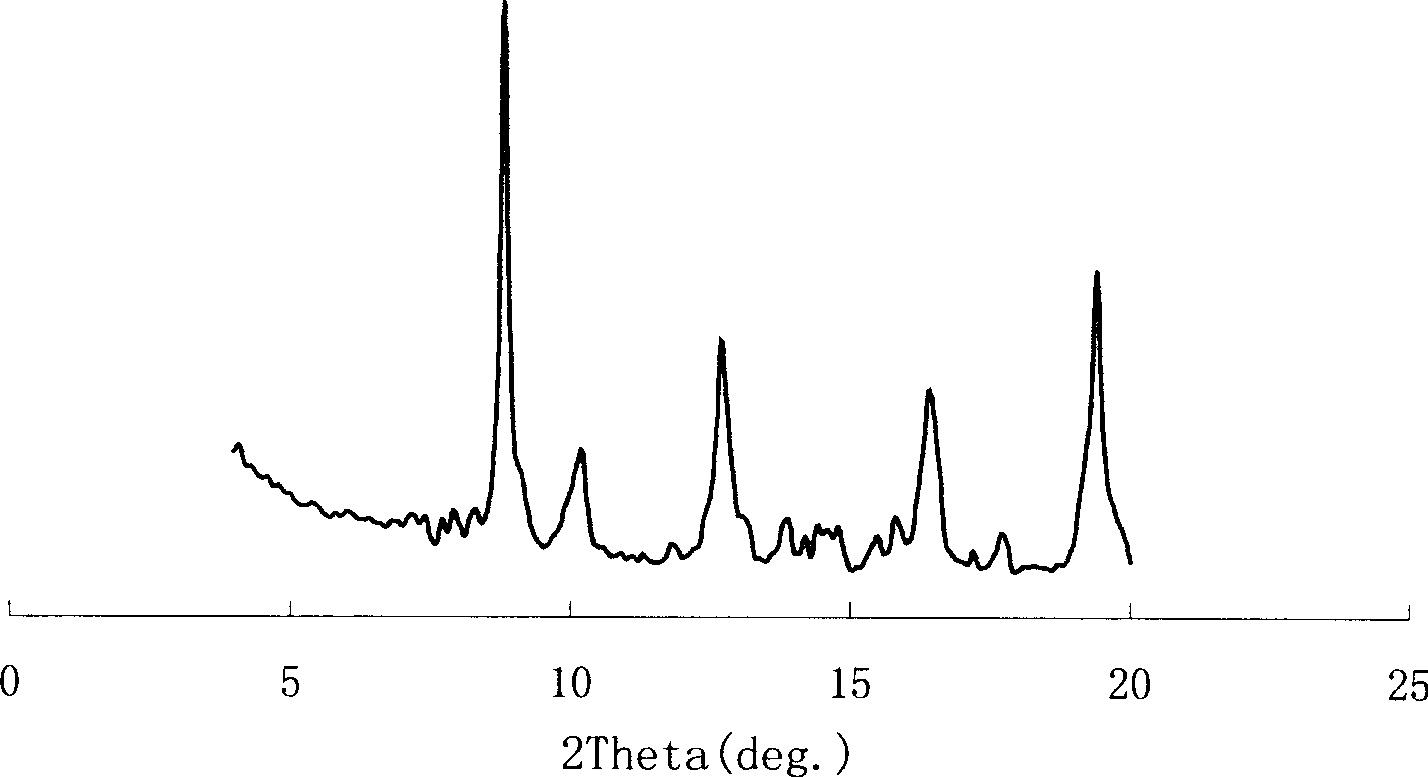Hydrotreatment catalyst and its preparation method
A hydrogenation treatment and catalyst technology, applied in the direction of physical/chemical process catalysts, catalyst carriers, chemical instruments and methods, etc., can solve the problem that it is difficult to achieve deep desulfurization and denitrification, the activity of the catalyst system is not sufficient, and it is difficult to meet the product quality Requirements and other issues to achieve the effect of high HDS and HDN activity
- Summary
- Abstract
- Description
- Claims
- Application Information
AI Technical Summary
Problems solved by technology
Method used
Image
Examples
Embodiment 1
[0058] Modified alumina prepared according to the method provided by the invention.
[0059] Add 10L of 40g Al to a 100L plastic tank 2 o 3 / L of sodium metaaluminate solution and 2L concentration of 15g SiO 2 / L sodium silicate solution, mix well, raise the temperature to 75°C, then gradually add Al with a concentration of 20g 2 o 3 / L, the temperature is the aluminum sulfate solution of 75 ℃, stop adding aluminum sulfate solution when the pH value of slurry is 8.0, continue to stir at constant temperature for 5 minutes, then add the dilute nitric acid solution that concentration is 5wt%, adjust the pH value of slurry to be 2.5 , stirred at constant temperature for 5 minutes, then added the sodium metaaluminate solution of the above properties, adjusted the pH value of the slurry to 9.0, continued to stir at constant temperature for 5 minutes, repeated swinging the pH value twice, and then added 2L of 8g TiO 2 / L of titanium sulfate solution, and control the addition rate...
Embodiment 2
[0061] Modified alumina prepared according to the method provided by the invention.
[0062] Compared with Example 1, the difference is that the amount of sodium silicate solution added and the amount of titanium sulfate solution are different, and all the other are the same as Example 1 to obtain modified alumina, which has the following characteristics: (1) the silicon dioxide content is 0.2wt%, (2) titanium dioxide content is 20wt%, (3) specific surface area is 310m 2 / g, (4) The pore volume is 0.80ml / g, (5) The pore volume with a pore diameter of 8nm to 15nm accounts for 75% of the total pore volume, (6) The amount of infrared acid ≥ 350°C is 0.04mmol / g, of which B acids accounted for 42% of the total acids.
Embodiment 3
[0064] Modified alumina prepared according to the method provided by the invention.
[0065] Compared with Example 1, the difference is that the amount of sodium silicate solution added and the amount of titanium sulfate solution are different, and all the other are the same as Example 1 to obtain modified alumina, which has the following characteristics: (1) the silicon dioxide content is 19.6wt%, (2) titanium dioxide content is 0.4wt%, (3) specific surface area is 366m 2 / g, (4) The pore volume is 1.04ml / g, (5) The pore volume with a pore diameter of 8nm to 15nm accounts for 85% of the total pore volume, (6) The amount of infrared acid ≥ 350°C is 0.10mmol / g, of which B acids accounted for 54% of the total acids.
PUM
| Property | Measurement | Unit |
|---|---|---|
| Diameter | aaaaa | aaaaa |
| Specific surface area | aaaaa | aaaaa |
| Pore volume | aaaaa | aaaaa |
Abstract
Description
Claims
Application Information
 Login to View More
Login to View More - R&D
- Intellectual Property
- Life Sciences
- Materials
- Tech Scout
- Unparalleled Data Quality
- Higher Quality Content
- 60% Fewer Hallucinations
Browse by: Latest US Patents, China's latest patents, Technical Efficacy Thesaurus, Application Domain, Technology Topic, Popular Technical Reports.
© 2025 PatSnap. All rights reserved.Legal|Privacy policy|Modern Slavery Act Transparency Statement|Sitemap|About US| Contact US: help@patsnap.com



